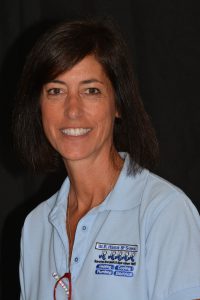
According to Karen Johnson, president of W. F. Hann and Sons, she found her voice later in life. Karen is quick to say she puts family first and she was out of the workforce for quite a while to stay home with her five children. When her youngest child went into high school, she began looking for part-time work – not realizing that a career in field service was going to land in her lap.
Karen’s brother is one of the owners of W. F. Hann and he called Karen nine years ago to ask her to come on board as the company’s controller (her history prior to having children is in accounting). While it was more hours and responsibility than Karen had been seeking, she said yes – and nine years later has progressed from controller to COO to president of the company. In the nine years she’s been at W. F. Hann, Karen says she’s never had a female apply for a field service position – but she sees that changing in the next five years. “Women are finding their voice in this industry,” she says, “and it’s exciting to witness.”
If you look at the team page of the W. F. Hann website, it provides a great visual representation of the work that remains to make women more central in the workforce. After Karen’s headshot as president, you see only men until you reach the “office support” section. I asked Karen what she feels the biggest challenge is as a woman in field service, and she explains “I can say the same thing a man will say, but it is taken differently.” I think it’s safe to say that there are plenty of women that would agree with Karen and I think it is high time that change.
Evangelizing the Field Service Opportunity
One of the first steps that needs to occur in an effort to bring more women – more diversity in general – into the field service industry is an effort to create greater awareness of the opportunity that exists within field service. “We have such a hard time finding field service workers,” says Karen. “Kids are taught they have to have a college degree, but the reality is that isn’t for everyone. Kids were driven away from technical schools, and as a result college debt in our nation is unbelievable. You can make a phenomenal living in field service, it is an incredible opportunity – we need to do a better job of making that known.” In Karen’s home town of Cleveland, OH, technical schools have been closed. W. F. Hann is in the same boat as many other field service organizations, in dire need of field service talent – all while kids with college degrees search fruitlessly for decent-paying jobs with which to pay back loans. This isn’t at all to say college is a bad choice, but to echo Karen’s point – it isn’t for everyone, and field service can be a great alternative.
Reward the Demanding Nature of Field Service
Another great point that Karen brought up is that to attract employees to the industry, we need to think about what we’re asking of them and reward them appropriately. As she points out, “service is a 24/7 job – it is a lot to ask of an employee. How can you give back to them?”
W.F. Hann has taken tactical steps to make its employees feel valued in relation to the efforts they are putting in. For example, the company has introduced 401K match and profit sharing options. When an employee is on-call, they are paid whether they end up with a service call or not – and paid time and a half if they do. Employees are paid holidays and if a layoff is necessary, major medical is covered for that employee for three months. The company has also implemented incentive programs, hired food trucks for the employees, and put on family events. “It’s vital to make your employees feel valued,” says Karen. “I have an open-door policy. Each employee knows that I am here to listen to them, and that anything they tell me remains confidential. They trust me, and that’s important to me.” Karen adds that in today’s technology-driven world, it can’t be overemphasized the importance of maintaining a personal touch.
Another area Karen feels is vital is training. “We focus heavily on training. I encourage it with all of my employees. Whether it’s customer service, technology, new products or changes in federal regulations, we constantly are learning. When you continue to learn, you will continue to grow,” she says.
By better communicating the potential in field service and treating its employees well, Karen is confident that in the next five years she’ll see many more women on her team. Her advice to any woman considering a career in field service is: “Don’t be afraid to enter a male-dominated environment. There’s a huge opportunity for more women to find their voice in field service; it’s time to seize it.”




